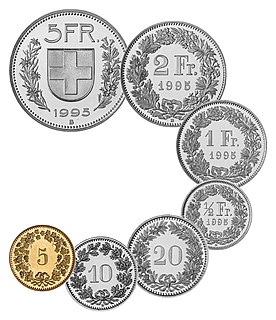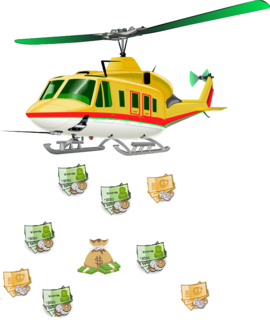Seigniorage, also spelled seignorage or seigneurage, is the difference between the value of money and the cost to produce and distribute it. The term can be applied in two ways:

A reserve currency is a foreign currency that is held in significant quantities by central banks or other monetary authorities as part of their foreign exchange reserves. The reserve currency can be used in international transactions, international investments and all aspects of the global economy. It is often considered a hard currency or safe-haven currency.

Monetary reform is any movement or theory that proposes a system of supplying money and financing the economy that is different from the current system.

The Swiss franc is the currency and legal tender of Switzerland and Liechtenstein. It is also legal tender in the Italian exclave of Campione d'Italia. The Swiss National Bank (SNB) issues banknotes and the federal mint Swissmint issues coins.
Full-reserve banking is a system of banking where banks do not lend demand deposits and instead, only lend from time deposits. It differs from fractional-reserve banking, in which banks may lend funds on deposit, while fully reserved banks would be required to keep the full amount of each depositor's funds in cash, ready for immediate withdrawal on demand.
Foreign exchange reserves are cash and other reserve assets such as gold held by a central bank or other monetary authority that are primarily available to balance payments of the country, influence the foreign exchange rate of its currency, and to maintain confidence in financial markets. Reserves are held in one or more reserve currencies, nowadays mostly the United States dollar and to a lesser extent the euro.

The Swiss National Bank is the central bank of Switzerland, responsible for the nation's monetary policy and the sole issuer of Swiss franc banknotes. The primary goal of its mandate is to ensure price stability, while taking economic developments into consideration.

Helicopter money is a proposed unconventional monetary policy, sometimes suggested as an alternative to quantitative easing (QE) when the economy is in a liquidity trap. Although the original idea of helicopter money describes central banks making payments directly to individuals, economists have used the term 'helicopter money' to refer to a wide range of different policy ideas, including the 'permanent' monetization of budget deficits – with the additional element of attempting to shock beliefs about future inflation or nominal GDP growth, in order to change expectations. A second set of policies, closer to the original description of helicopter money, and more innovative in the context of monetary history, involves the central bank making direct transfers to the private sector financed with base money, without the direct involvement of fiscal authorities. This has also been called a citizens' dividend or a distribution of future seigniorage.

Switzerland is not a member state of the European Union (EU). It is associated with the Union through a series of bilateral treaties in which Switzerland has adopted various provisions of European Union law in order to participate in the Union's single market, without joining as a member state. All but one of Switzerland's neighbouring countries are EU member states.

Money is any item or verifiable record that is generally accepted as payment for goods and services and repayment of debts, such as taxes, in a particular country or socio-economic context. The main functions of money are distinguished as: a medium of exchange, a unit of account, a store of value and sometimes, a standard of deferred payment. Any item or verifiable record that fulfils these functions can be considered as money.

Currency intervention, also known as foreign exchange market intervention or currency manipulation, is a monetary policy operation. It occurs when a government or central bank buys or sells foreign currency in exchange for its own domestic currency, generally with the intention of influencing the exchange rate and trade policy.

Fiat money is a type of money that is not backed by any commodity such as gold or silver, and typically declared by a decree from the government to be legal tender. Throughout history, fiat money was sometimes issued by local banks and other institutions. In modern times, fiat money is generally established by government regulation.
Ten referendums were held in Switzerland during 1999. The first four were held on 7 February on changes to the eligibility for membership of the Federal Council (approved), constitutional regulations on organ transplantation (approved), a popular initiative "house ownership for everyone" (rejected) and an amendment to the federal law on spatial planning (approved). The fifth was held on 18 April on a new Swiss Federal Constitution, which was approved.
Twelve national referendums were held in Switzerland during 2014.

Gold repatriation refers to plans of various governments to bring home their gold stored outside the home country.
The following lists events that happened during 2014 in Switzerland.
A central bank digital currency (CBDC) is a digital currency issued by a central bank, rather than by a commercial bank.
The Swiss sovereign money initiative of June 2018, also known as Vollgeld, was a citizens' (popular) initiative in Switzerland intended to give the Swiss National Bank the sole authority to create money.
Several federal referendums were held in Switzerland in 2020, with voting on 9 February, 27 September and 29 November. Voting was also planned for 17 May, but was postponed due to the COVID-19 pandemic.












